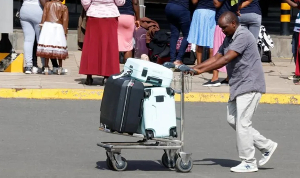Business News of Wednesday, 26 March 2003
Source: Ghanaian Chronicle
Illicit Forex Dealings Cost Nation ?Billions
GHANA IS losing about ?100 million a month from bad deals in the foreign exchange business, well-informed sources within the industry have intimated to Chronicle.
In addition, an enormous sum of about ?1 billion is lost every year through the activities of dealers in foreign currencies outside the banks and the forex bureaus (FB) popularly called "black marketeers". These losses comprise non-payment of taxes, and fees as well as causing reduction in the volume of businesses FBs get, thereby reducing taxes collected.
Investigations conducted by Chronicle showed that the black market, which constitutes about a third the size of the entire FB market, could have contributed a lot to revenue generation of the country, if they had been integrated into the market, and brought under the relevant tax regimes.
The black marketeers, who traditionally operate at Zongo Lane and Cow Lane, have now extended their activities to the Kwame Nkrumah Circle area in Accra. It has also been revealed that their activities have increased in almost all the regional capitals in the country.
It would be recalled that the Ashanti regional branch of the Forex Bureau Associations (FBA), a few months ago, threatened to embark on an industrial action, if the Bank of Ghana (BoG) failed to take action against the operations of these black marketeers. They even went to the extent of saying that some staff of the BoG were conniving with the black marketeers to alert them when police would conduct swoops.
Information gathered indicates that a lot of fraudulent activities, like selling of counterfeit foreign currencies to customers without their knowledge is impacting negatively on the economy of the country.
According to the president of the FBA, Dr. Joseph Gya-Baah, the activities of the black marketeers have reduced the volume of their business by 'playing between their rates'. He said, "they buy foreign currencies at a price higher than the forex rate and sell at a price lower than ours." He lamented that this has led to the reduction of the their supply of forex and patronage.
Dr. Gya-Baah said this situation arose as a result of poor control on the part of the BoG and the police to sustain their arrest and also, integrate them into the tax system. "When we go to the BoG, they say their duty is to report the black market activities to the police because they are not law enforcers," he added. He said the police have proved to be unco-operative in arresting the marketeers. "These nation-wreckers must be reduced, if not eliminated," he stated.
Speaking on other problems facing the association, he stated that since the New Patriotic Party (NPP) government took office, they have not received any intervention money from the state, thereby reducing their hard currencies. Intervention money is foreign currency given to FBs by the government to help sustain them when business goes down.
He also said that the new BoG criteria for categorizing forex bureaus are too stringent to satisfy. According to the BoG, category A would consist of all forex bureaus which exceed a turnover of $3 million. Forex bureaus in this category would then be allowed to establish more than three branches.
All forex bureaus that make a turnover of $2million and above annually are classified to be in category B and could open two or more branches while category C would comprise bureaus which make a turnover below $2 million annually and are not allowed to set up a branch.
On the contributions of the association to the development of the country, Dr. Gya-Baah indicated that the 285-member association contributes about ?1.4 billion annually to the state through taxes and a minimum of about $3 million to the BoG. He also said that the industry employs about 800 people in the country.
He said members of the association have not reported of any armed robbery case since last October and hoped things would remain the same till his mandate comes to an end.












